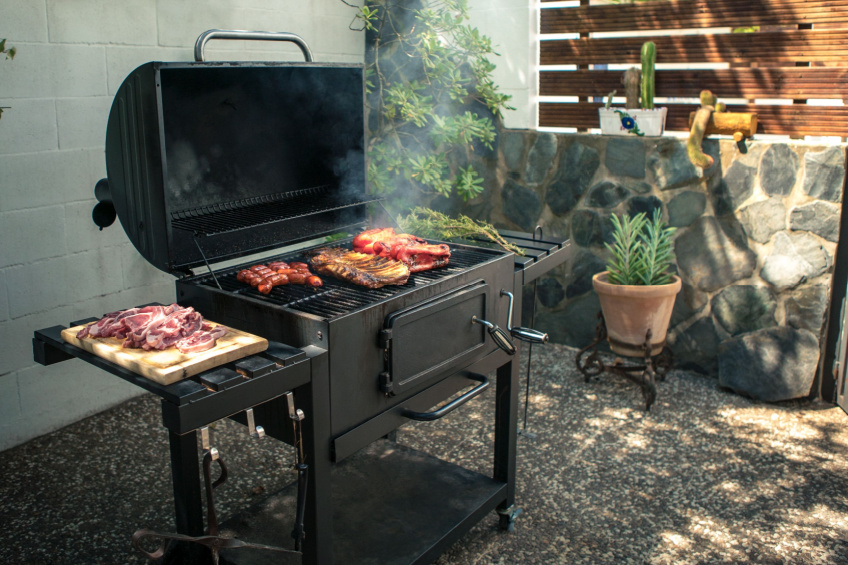
Choosing the healthiest type of grill is an important decision for those who love outdoor cooking.
Grilling can be a delicious and enjoyable way to prepare meals, but it’s essential to consider which method promotes better health.
Electric grills are often deemed the healthiest option, as they produce fewer carcinogens compared to charcoal and gas grills.
Electric grills excel in controlling temperature, which can help minimize harmful compounds that might form on the food during cooking.
Additionally, they don’t produce open flames, reducing the risk of charring food.
These factors make them a popular choice for health-conscious individuals.
Charcoal and gas grills are also popular but have noted drawbacks related to smoke and fuel residue that might not align with health-focused grilling.
They do offer distinct flavors that many grill enthusiasts appreciate, presenting a trade-off between taste and health considerations.
Understanding Different Types of Grills

Grilling is a popular cooking method that adds a distinct flavor to food.
Choosing the right type of grill can enhance the grilling experience and impact the flavor, convenience, and health aspects of the food prepared.
Charcoal Grills
Charcoal grills use charcoal briquettes or lump charcoal as the primary fuel source.
Flavor is a major advantage; these grills impart a smoky taste that many grilling enthusiasts crave.
They reach high temperatures, which is ideal for searing meat.
On the downside, charcoal grills require more preparation time.
Lighting the charcoal and waiting for it to heat up can be time-consuming.
Additionally, users must manage the ash disposal after cooking.
It’s essential to maintain a clean grill to prevent flare-ups and ensure safety.
Portable versions of charcoal grills are available, making them a suitable choice for camping and tailgating.
Despite the extra effort involved, many find the flavor of charcoal-grilled food worth the hassle.
Gas Grills
Gas grills run on propane or natural gas, providing a convenient and easy grilling experience.
They are quick to start and easy to adjust, offering precise temperature control.
This can be particularly beneficial when cooking different types of food.
Gas grills produce fewer flare-ups compared to charcoal, reducing the risk of burning.
Cleaning is often simpler, as there is no ash waste.
Despite these advantages, some argue that gas grills lack the distinctive smoky flavor that charcoal provides.
Portable and built-in options are available, accommodating different culinary settings.
Ideal for frequent grillers seeking efficiency, gas grills offer a balance of convenience and performance.
Electric Grills
Electric grills are perfect for those living in areas with fire restrictions or without outdoor space.
Easy to use, they require a simple plug-in connection and offer indoor or outdoor use.
These grills provide consistent heat, making it easy to achieve even cooking results.
While they lack the traditional smoky flavor, some models include added smoke-infusing technology.
Electric grills are typically compact, making them suitable for small spaces.
Cleaning is straightforward due to their non-combustion operation.
They are a practical choice for those who prioritize convenience over the traditional flavor experience of grilling.
Despite taste limitations, the health benefits and ease of use are appealing.
Portable Grills
Portable grills come in various fuel types: charcoal, gas, and electric.
Their main appeal is their mobility.
Lightweight and compact, they are easy to transport, making them ideal for picnics, camping, and beach outings.
These grills often feature folding legs or removable components for easy storage.
Cooking space may be limited, influencing what and how much you can grill at once.
Portability does not significantly compromise functionality, and many models offer similar features to their larger counterparts.
Perfect for those on the go, portable grills provide flexibility and convenience for grilling enthusiasts.
Health Benefits and Risks Associated with Grilling

Grilling offers certain health benefits, such as the reduction of fat in meats.
Yet, it can also lead to the formation of harmful compounds under certain conditions.
Reduced Fat Content
Grilling is known for its ability to reduce fat content, particularly in meats.
As the meat cooks on a grill, excess fat drips away through the grates.
This process can lead to a leaner piece of meat compared to some other cooking methods that retain fat.
Fats that liquify and escape during grilling reduce calorie intake, which can benefit those managing their weight.
Grilled vegetables also maintain a nutritious profile while requiring minimal to no additional oils.
By focusing on non-toxic grill materials such as stainless steel and ceramic coatings, health-conscious individuals can further minimize potential risks.
Formation of Harmful Compounds
The high temperatures associated with grilling can lead to the formation of potentially harmful compounds like polycyclic aromatic hydrocarbons (PAHs) and heterocyclic amines (HCAs).
These compounds are linked to prolonged high-temperature cooking, especially when fats and juices drip onto hot surfaces, creating smoke.
To reduce these risks, grilling techniques such as using marinades, pre-cooking meats, or grilling at lower temperatures can be effective.
Choosing a non-toxic grill that minimizes chemical reactions with food can also help reduce the formation of these compounds, making grilling a safer cooking option.
Factors Contributing to a Grill’s Healthiness

The healthiness of a grill largely depends on three main factors: maintaining appropriate temperature control, choosing a suitable fuel source, and using safe cookware material.
Each of these factors impacts the healthiness of the food being prepared.
Temperature Control
Effective temperature control is crucial for cooking food safely and healthily.
Grills with precise temperature settings help avoid undercooking or charring food, both of which can have health implications.
Under-cooked food may harbor harmful bacteria, while charred food can produce carcinogens.
Electric grills and gas grills often offer more precise temperature control compared to charcoal grills.
Built-in thermometers can further assist in monitoring the cooking process.
Consistent temperature control ensures that food is cooked evenly, which is essential for maintaining nutritional quality and safety.
Fuel Source
The type of fuel used in grilling can significantly affect the healthiness of the meal.
Gas grills typically use propane or natural gas, producing fewer air pollutants than charcoal.
This makes them a cleaner option for those concerned about inhaling harmful fumes.
Charcoal grills, while popular for imparting a smoky flavor, can emit higher amounts of carbon monoxide and volatile organic compounds.
Lump charcoal is a slightly cleaner alternative to briquettes.
When possible, opting for a cleaner fuel source can contribute to a healthier grilling experience.
Cookware Material
The material of the cookware used on a grill can also influence health outcomes.
Using non-reactive materials like stainless steel or cast iron can minimize the leaching of metals into food.
Non-stick grill surfaces are convenient but should be monitored for wear, as damaged coatings can degrade at high temperatures.
Avoid using cookware made from materials that can react with acidic foods, such as aluminum, which may impart an undesirable taste and release unwanted substances.
Choosing the appropriate cookware material supports food safety and can enhance both the healthiness and flavor of grilled meals.
Best Practices for Healthy Grilling

Healthy grilling involves reducing smoke exposure, selecting nutritious marinades and rubs, and maintaining a clean grill.
These steps help improve both the safety and the taste of grilled foods.
Minimizing Smoke Exposure
Grilling can produce smoke containing substances that are harmful to health.
To minimize exposure, it is advisable to trim excess fat from meat, reducing flare-ups that cause smoke.
Using a non toxic grill, such as one with an enamel-coated surface, can help decrease unhealthy residue adhesion.
 An example of an electric smokeless grill with an enamel-coated surface is the Cuisinart GR-300WS Griddler Elite.
An example of an electric smokeless grill with an enamel-coated surface is the Cuisinart GR-300WS Griddler Elite.
This versatile electric grill features a removable, enamel-coated cast iron cooking plate that provides excellent heat retention and easy cleaning.
The grill offers multiple cooking functions, including a sear option for high heat, making it ideal for both grilling and indoor cooking.
With a spacious cooking surface and adjustable temperature controls, this model provides even heat distribution and reduces smoke, making it a great option for smokeless indoor grilling.
This type of grill is particularly beneficial for those looking for an enamel-coated surface along with smokeless grilling technology for indoor use.
Indirect grilling methods, where food is not placed directly over flames, can also be beneficial.
Covering the grill can reduce fat drippings that contribute to smoke.
Keeping the grill at lower temperatures can prevent the formation of potentially harmful compounds.
Choosing Healthier Marinades and Rubs
Marinades can impact healthiness by significantly reducing the formation of dangerous compounds in grilled food.
Choosing marinades rich in antioxidants, such as those containing lemon juice, vinegar, or herbs like rosemary, is recommended.
These ingredients can protect the meat and provide additional health benefits.
Avoid high-sugar marinades, as they can char easily, forming unhealthy burned crusts.
Instead, consider using rubs made from spices and herbs without added sugars or chemicals.
Making marinades at home allows control over ingredient quality and prevents unhealthy additives.
Regular Maintenance and Cleaning
A clean grill is crucial for healthier grilling.
It prevents the buildup of carcinogenic residues and reduces the risk of contamination.
Regular cleaning of the grill grates, ideally after each use, is recommended.
Utilizing a wire brush to remove stuck-on particles helps maintain a clean grilling surface.
For those seeking a Non Toxic Grill experience, consider using non-toxic cleaning agents or making a natural cleaning solution with vinegar and baking soda.
Replacing worn grates is essential to ensure safety and optimal cooking results.
Top Health-Conscious Grill Models

Choosing the right grill involves considering health-conscious features and cooking methods.
Exploring options like charcoal, gas, and electric grills helps identify models that promote healthier cooking with less harmful emissions and features like temperature control.
Charcoal Grill Recommendations
Charcoal grills impart a distinct flavor to food but have traditionally been criticized for producing potential carcinogens.
Kettle grills with adjustable vents can mitigate smoke exposure, aligning with health-conscious cooking methods.
Using natural lump charcoal reduces chemical exposure compared to briquettes.
 The Weber Original Kettle Premium is recommended for its high-quality materials and precise temperature control.
The Weber Original Kettle Premium is recommended for its high-quality materials and precise temperature control.
Its porcelain-enameled bowl and lid ensure durability and are non-toxic, resisting rust and preventing flaking that could compromise food safety.
It ensures a safe cooking environment while retaining the essence of traditional grilling.
Gas Grill Recommendations
Gas grills are preferred for their convenience and cleaner burning compared to charcoal, releasing fewer carcinogenic compounds.
Models with infrared technology distribute heat more evenly and reduce flare-ups.
 The Char-Broil Performance TRU-Infrared Gas Grill is a non-toxic grilling option designed with safety and health in mind.
The Char-Broil Performance TRU-Infrared Gas Grill is a non-toxic grilling option designed with safety and health in mind.



